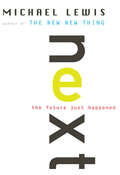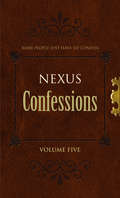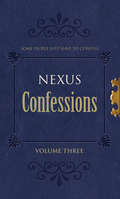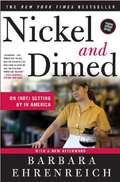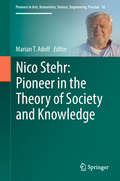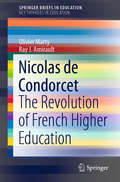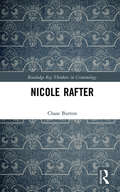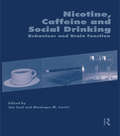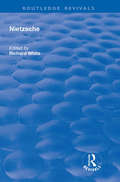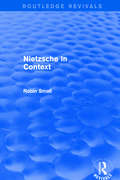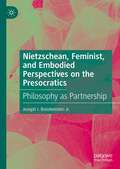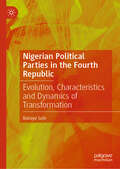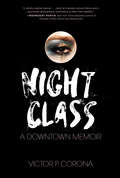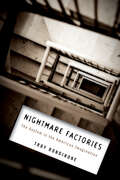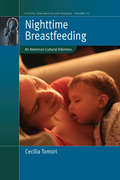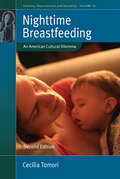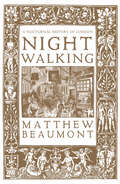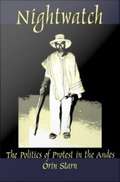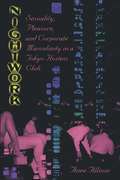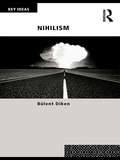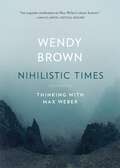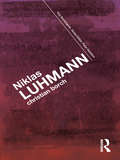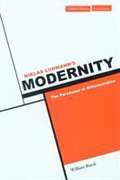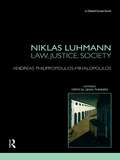- Table View
- List View
Next: The Future Just Happened
by Michael LewisThe New York Times bestseller. "His book is a wake-up call at a time when many believe the net was a flash in the pan."--BusinessWeek With his knowing eye and wicked pen, Michael Lewis reveals how the Internet boom has encouraged changes in the way we live, work, and think. In the midst of one of the greatest status revolutions in the history of the world, the Internet has become a weapon in the hands of revolutionaries. Old priesthoods are crumbling. In the new order, the amateur is king: fourteen-year-olds manipulate the stock market and nineteen-year-olds take down the music industry. Unseen forces undermine all forms of collectivism, from the family to the mass market: one black box has the power to end television as we know it, and another one may dictate significant changes in our practice of democracy. With a new afterword by the author.
Nexus Confessions: Volume Five (Nexus Confessions #5)
by VariousNexus Confesions - true erotic stories from real-life fetish enthusiasts...Swinging, dogging, group sex, cross-dressing, spanking, female domination, corporal punishment, and extreme fetishes...Nexus Confessions explores the length and breadth of erotic obsession, real experience and sexual fantasy. This is an encyclopaedic collection of the bizarre, the extreme, the utterly inappropriate, the daring and the shocking experiences of ordinary men and women driven by their extraordinary desires. Collected by the world's leading publisher of fetish fiction, this is the fifth in a series of six volumes of true stories and shameful confessions, never-before-told or published.
Nexus Confessions: Volume Three (Nexus Confessions #3)
by VariousNexus Confessions - true life erotic stories from fetish enthusiasts...Nexus Confessions explores the length and breadth of erotic obsession, real experience and sexual fantasy. This is an encyclopaedic collection of the bizarre, the extreme, the utterly inappropriate, the daring and the shocking experiences of ordinary men and women driven by their extraordinary desires. Collected by the world's leading publisher of fetish fiction, this is the third in a series of six volumes of true stories and shameful confessions, never-before-told or published.
Nickel and Dimed
by Barbara Ehrenreich Frances Fox PivenAcclaimed as an instant classic upon publication, "Nickel and Dimed" has sold more than 1. 5 million copies and become a staple of classroom reading. Chosen for "one book" initiatives across the country, it has fueled nationwide campaigns for a living wage. Funny, poignant, and passionate, this revelatory firsthand account of life in low-wage America--the story of Barbara Ehrenreich's attempts to eke out a living while working as a waitress, hotel maid, house cleaner, nursing-home aide, and Wal-Mart associate--has become an essential part of the nation's political discourse. Now, in a new afterword, Ehrenreich shows that the plight of the underpaid has in no way eased: with fewer jobs available, deteriorating work conditions, and no pay increase in sight, "Nickel and Dimed" is more relevant than ever.
Nico Stehr: Pioneer in the Theory of Society and Knowledge (Pioneers in Arts, Humanities, Science, Engineering, Practice #16)
by Marian T. AdolfThis unique volume brings together a selection of the most important texts of Nico Stehr for the first time and puts them in dialogue with original research that draws on his prolific work. Covering five decades of pioneering sociological research on the theory of society and knowledge, the book introduces the reader to Stehr’s seminal inquiries into the economic, political and social role of knowledge. Original concepts, such as his groundbreaking studies on the Knowledge Society, are introduced as the volume traces Stehr’s pursuit of social scientific research as a source of practical knowledge for modern society.The book comprises three parts devoted to the many facets and the remarkable range of Nico Stehr’s oeuvre. Part 1 provides an introduction to the significance of his pioneering work and career. Part 2 demonstrates the practical application of Nico Stehr’s research as seen through the eyes of eminent scholars. Part 3 presents a selection of the milestones of his publications.
Nicolas de Condorcet: The Revolution of French Higher Education (SpringerBriefs in Education)
by Olivier Marty Ray J. AmiraultThis Springer brief explores the contribution of Nicolas de Condorcet in French higher education, the historical development of his work and its influence on the history of the French education system.Condorcet's educational proposals were first devised as five Memoires, which were consolidated into the ‘Rapport et Projet de Decret sur l'Organisation Generale de l'Instruction Publique’. This report has sparked debate on the subject of education in the past and lives on as a basis for ongoing iterations of plans for education by other writers.In developing these ideas and especially how they apply to higher education, this book bridges the gap between the 18th century French Enlightenment shift and the Revolution of higher education, with the advent of the Grandes Écoles such as École Normale Supérieure, École Polytechnique and Conservatoire National des Arts et Metiers. Each of these schools was represented by a specific institutionalized educational idea rooted in the works of the philosopher.This book offers insights to a wider audience in the educational thought of Condorcet, which at the time of his writing was overshadowed by Rousseau, and shows how his ideas of liberty and equality flourish in the French educational system and remain an important part in today's French academic, cultural and political culture.
Nicole Rafter (Routledge Key Thinkers in Criminology)
by Chase BurtonThis book is a critical summary and exegesis of the work of Nicole Rafter, who was a leading scholar of the history of biological theories of crime causation as well as a profound theorist of the role of history within criminology. It introduces Rafter’s key works and assesses her contributions to the fields of feminist criminology, cultural criminology, visual criminology and historical criminology. It also explores her theorization of criminology’s identity, scientific status, and possible futures. While many books on criminological theory explain and historically contextualize theory, they do not interrogate the production of theory or the epistemological assumptions behind it. Drawing on the world of Nicole Rafter, this book offers an accessible handbook to her extensive historical studies and to how her work demonstrated the importance of historical theory to criminological knowledge. Furthermore, the author brings Rafter’s historical research to life and shows how it speaks to contemporary issues in criminology and punishment. Written in a clear and direct style, this book will appeal to students and scholars of criminological theory, intellectual history, sociology, comparative criminology, and feminist criminology.
Nicotine, Caffeine and Social Drinking: Behaviour and Brain Function
by Monicque Lorist Jan SnelOften, people use nicotine, caffeine, and some level of alcohol in varying combinations at different times of the day in order to optimize their functioning and feelings of well-being, whether at work, in leisure time, or in a social context. However, until now, studies on the effects of this everyday practice have been diverse, widespread, and insufficiently summarized. Recently developed methods to study the effects in more detail have received little attention, especially among a nonscientific readership. Nicotine, Caffeine and Social Drinking focuses readers' attention on the effects of normal, socially accepted psychoactive substances on cognitive performance and on the brain. Divided into three sections, this book studies each substance individually before examining the effects of their combined usage.
Niederschwellig arbeiten. Eine problemsoziologische Study of Work in Anlaufstellen für männliche Sexarbeitende
by Marlen Simone LöfflerWie erreicht man Menschen, denen aus Sicht der Gesellschaft unbedingt geholfen werden sollte, die aber selbst keine Hilfe anfordern? Dieser Frage geht Marlen S. Löffler in ihrer ethnomethodologischen Ethnographie in niederschwelligen Anlauf- und Beratungsstellen für männliche Sexarbeitende nach. Auf der Basis einer problemsoziologischen und ethnomethodologischen Study of Work zeigt sie, wie Sozialarbeitende Niederschwelligkeit bewerkstelligen und inwiefern die diskursive Hervorbringung der Problemkategorie „männlicher Sexarbeitender“ an die Praktiken der Niederschwelligkeit gekoppelt ist. Der Band trägt zum grundlegenden Verständnis niederschwelliger Sozialer Arbeit und zu einer kritischen Auseinandersetzung mit problemsoziologischen Ansätzen bei.
Nietzsche (Routledge Revivals)
by Richard WhiteThis title was first published in 2002: Nietzsche described himself as a godless anti-metaphysician. These writings encourage the student to question any reading that fails to address Nietzsche's sense of irony with respect to his own philosophical claims. The anthology includes the best recent writings on Nietzsche. It covers all the main themes of Nietzsche's philosophy and pays particular attention to Nietzsche's discussion of value and the need for a re-evaluation of values; his critique of metaphysics and the problem of knowledge; and his account of art and politics.
Nietzsche in Context
by Robin SmallThis title was first published in 2001. Friedrich Nietzsche has always been recognized as an original thinker, one who stands apart from and outside the philosophical schools and tendencies of his time. This is the way he continually presented himself. Many readers have accepted this self-interpretation at face value. Yet there is another side to Nietzsche's thinking which shows not only an awareness of contemporary writers, but an engagement with their ideas which is often both intense and sustained. The intention of this study is to explore this side in detail, by surveying various themes in his philosophical thinking with such links in mind. It is important to avoid one misunderstanding though: this book is not designed to show that Nietzsche derived his ideas from various other thinkers. In that sense, it is not necessarily about "sources" or even about "influences". Rather, it shows that his independence and originality developed in dialogue with other thinkers.
Nietzschean, Feminist, and Embodied Perspectives on the Presocratics: Philosophy as Partnership
by Joseph I. Breidenstein Jr.This book is the first sustained scholarly account of women and goddesses in presocratic philosophy. It approaches the origin of western philosophy via Nietzsche, Feminism, and Embodied Cognition in order to argue that the presocratics were reviving, within the largely patriarchal and death-glorifying culture of archaic Greece, a paleo/neolithic goddess-centered religiosity that affirmed life and rebirth. By taking readers from prehistoric Europe to classical Athens, Joseph I. Breidenstein Jr. provides a novel narrative of the dawn of western philosophy which is more comprehensive than traditional accounts and which helps us address contemporary problems—the patriarchal attitudes and ideas that continue to corrupt academic-philosophical culture; the fascist-dominator lifestyle that continues to threaten western democracy and which is encouraged by the patriarchal aspects of academia; and the consumerism that continues to result from a materialistic-secular paradigm that is being increasingly recognized as both intellectually untenable and socially unsustainable.
Nigerian Political Parties in the Fourth Republic: Evolution, Characteristics and Dynamics of Transformation
by Babayo SuleThis book examines the changing dynamics of political parties in Nigeria's Fourth Republic. It is a comprehensively study of these parties' development, character and systems in relation to everything from ideology, funding and crises to leadership, civil society, traditional and social media, and electoral politics. The author shows that, while the organisation and institutionalisation of Nigerian political parties remain fragile, they have taken on a new form in the Fourth Republic. The book provides researchers, policymakers and students with insights into the development of Nigeria's politics in light of its colonial legacy and its struggle against the institutionalisation of strong political institutions for democratisation.
Night Class: A Downtown Memoir
by Victor CoronaThe playground of the rich and the beautiful, downtown New York's nightlife spectacles and power of self-invention incubated pop icons from Andy Warhol to Lady Gaga. NYU sociologist Victor P. Corona sought a new education, where night classes held in galleries, nightclubs, bars, apartments, stoops, and all-night diners taught him about love, loss, and the living possibilities of identity. Transforming himself from dowdy professor to glitzy clubgoer, Victor immerses himself among downtown's dazzling tribes of artists and performers hungry for fame.Night Class: A Downtown Memoir investigates the glamour of New York nightlife. In interviews and outings with clubland revelers and influencers, including Party Monster and convicted killer Michael Alig, Night Class exposes downtown's perilous trappings of drugs, ambition, and power. From closeted, undocumented Mexican boy to Ivy League graduate to nightlife writer, Corona shares in Night Class the thrill and tragedy of downtown and how dramatically identities can change.
Nightmare Factories: The Asylum in the American Imagination
by Troy RondinoneHow the insane asylum came to exert such a powerful hold on the American imagination.Madhouse, funny farm, psychiatric hospital, loony bin, nuthouse, mental institution: no matter what you call it, the asylum has a powerful hold on the American imagination. Stark and foreboding, they symbolize mistreatment, fear, and imprisonment, standing as castles of despair and tyranny across the countryside. In the "asylum" of American fiction and film, treatments are torture, attendants are thugs, and psychiatrists are despots. In Nightmare Factories, Troy Rondinone offers the first history of mental hospitals in American popular culture. Beginning with Edgar Allan Poe's 1845 short story "The System of Dr. Tarr and Prof. Fether," Rondinone surveys how American novelists, poets, memoirists, reporters, and filmmakers have portrayed the asylum and how those representations reflect larger social trends in the United States. Asylums, he argues, darkly reflect cultural anxieties and the shortcomings of democracy, as well as the ongoing mistreatment of people suffering from mental illness. Nightmare Factories traces the story of the asylum as the masses have witnessed it. Rondinone shows how works ranging from Moby-Dick and Dracula to One Flew Over the Cuckoo's Nest, Halloween, and American Horror Story have all conversed with the asylum. Drawing from fictional and real accounts, movies, personal interviews, and tours of mental hospitals both active and defunct, Rondinone uncovers a story at once familiar and bizarre, where reality meets fantasy in the foggy landscape of celluloid and pulp.
Nighttime Breastfeeding: An American Cultural Dilemma (Fertility, Reproduction and Sexuality: Social and Cultural Perspectives #26)
by Cecília TomoriNighttime for many new parents in the United States is fraught with the intense challenges of learning to breastfeed and helping their babies sleep so they can get rest themselves. Through careful ethnographic study of the dilemmas raised by nighttime breastfeeding, and their examination in the context of anthropological, historical, and feminist studies, this volume unravels the cultural tensions that underlie these difficulties. As parents negotiate these dilemmas, they not only confront conflicting medical guidelines about breastfeeding and solitary infant sleep, but also larger questions about cultural and moral expectations for children and parents, and their relationship with one another.
Nighttime Breastfeeding: An American Cultural Dilemma (Fertility, Reproduction and Sexuality: Social and Cultural Perspectives)
by Cecília TomoriNew parents in the United States are caught between responding to infant needs for closeness and breastfeeding, and cultural and medical norms that emphasize solitary sleep. This anthropological investigation shows that nighttime closeness and breastfeeding are the evolutionary and cross-cultural norm, but recent sociocultural shifts produced novel ideals of separation. The book uncovers how breastfeeding parents rework these cultural ideals. In this new edition, the author describes shifting medical guidance that increasingly supports breastfeeding yet remains largely separated from infant sleep guidance. The volume also provides a path towards more equitable approaches to nighttime infant care grounded in reproductive justice.
Nightwalking
by Will Self Matthew Beaumont"Cities, like cats, will reveal themselves at night," wrote the poet Rupert Brooke. Before the age of electricity, the nighttime city was a very different place to the one we know today - home to the lost, the vagrant and the noctambulant. Matthew Beaumont recounts an alternative history of London by focusing on those of its denizens who surface on the streets when the sun's down. If nightwalking is a matter of "going astray" in the streets of the metropolis after dark, then nightwalkers represent some of the most suggestive and revealing guides to the neglected and forgotten aspects of the city.In this brilliant work of literary investigation, Beaumont shines a light on the shadowy perambulations of poets, novelists and thinkers: Chaucer and Shakespeare; William Blake and his ecstatic peregrinations and the feverish ramblings of opium addict Thomas De Quincey; and, among the lamp-lit literary throng, the supreme nightwalker Charles Dickens. We discover how the nocturnal city has inspired some and served as a balm or narcotic to others. In each case, the city is revealed as a place divided between work and pleasure, the affluent and the indigent, where the entitled and the desperate jostle in the streets.With a foreword and afterword by Will Self, Nightwalking is a captivating literary portrait of the writers who explore the city at night and the people they meet.From the Hardcover edition.
Nightwatch: The Politics of Protest in the Andes
by Orin StarnOrganized in the mid-1970s as a means of communal protection against livestock rustling and general thievery in Peru's rugged northern mountains, the rondas campesinas (peasants who make the rounds) grew into an entire system of peasant justice and one of the most significant Andean social movements of the late twentieth century. Nightwatch is the first full-length ethnography and the only study in English to examine this grassroots agrarian social movement, which became a rallying point for rural pride. Drawing on fieldwork conducted over the course of a decade, Orin Starn chronicles the historical conditions that led to the formation of the rondas, the social and geographical expansion of the movement, and its gradual decline in the 1990s. Throughout this anecdotal yet deeply analytical account, the author relies on interviews with ronda participants, villagers, and Peru's regional and national leaders to explore the role of women, the involvement of nongovernmental organizations, and struggles for leadership within the rondas. Starn moves easily from global to local contexts and from the fifteenth to the twentieth century, presenting this movement in a straightforward manner that makes it accessible to both specialists and nonspecialists. An engagingly written story of village mobilization, Nightwatch is also a meditation on the nature of fieldwork, the representation of subaltern people, the relationship between resistance and power, and what it means to be politically active at the end of the century. It will appeal widely to scholars and students of anthropology, Latin American studies, cultural studies, history, subaltern studies, and those interested in the politics of social movements.
Nightwork: Sexuality, Pleasure, and Corporate Masculinity in a Tokyo Hostess Club
by Anne AllisonIn Nightwork, Anne Allison opens a window onto Japanese corporate culture and gender identities. Allison performed the ritualized tasks of a hostess in one of Tokyo's many "hostess clubs": pouring drinks, lighting cigarettes, and making flattering or titillating conversation with the businessmen who came there on company expense accounts. Her book critically examines how such establishments create bonds among white-collar men and forge a masculine identity that suits the needs of their corporations. Allison describes in detail a typical company outing to such a club—what the men do, how they interact with the hostesses, the role the hostess is expected to play, and the extent to which all of this involves "play" rather than "work. " Unlike previous books on Japanese nightlife, Allison's ethnography of one specific hostess club (here referred to as Bijo) views the general phenomenon from the eyes of a woman, hostess, and feminist anthropologist. Observing that clubs like Bijo further a kind of masculinity dependent on the gestures and labors of women, Allison seeks to uncover connections between such behavior and other social, economic, sexual, and gendered relations. She argues that Japanese corporate nightlife enables and institutionalizes a particular form of ritualized male dominance: in paying for this entertainment, Japanese corporations not only give their male workers a self-image as phallic man, but also develop relationships to work that are unconditional and unbreakable. This is a book that will appeal to anyone interested in gender roles or in contemporary Japanese society.
Nihilism (Key Ideas)
by Bulent DikenThis book addresses the genealogy and consequences of nihilism, attempts at 'sociologizing' the concept of nihilism by relating nihilism to capitalism, post-politics and terrorism, and considers the possibilities of overcoming nihilism.
Nihilistic Times: Thinking with Max Weber (The Tanner Lectures on Human Values)
by Wendy BrownOne of America’s leading political theorists analyzes the nihilism degrading—and confounding—political and academic life today. Through readings of Max Weber’s Vocation Lectures, she proposes ways to counter nihilism’s devaluations of both knowledge and political responsibility.How has politics become a playpen for vain demagogues? Why has the university become an ideological war zone? What has happened to Truth? Wendy Brown places nihilism at the center of these predicaments. Emerging from European modernity’s replacement of God and tradition with science and reason, nihilism removes the foundation on which values, including that of truth itself, stand. It hyperpoliticizes knowledge and reduces the political sphere to displays of narcissism and irresponsible power plays. It renders the profound trivial, the future unimportant, and corruption banal.To consider remedies for this condition, Brown turns to Weber’s famous Vocation Lectures, delivered at the end of World War I. There, Weber himself decries the effects of nihilism on both scholarly and political life. He also spells out requirements for re-securing truth in the academy and integrity in politics. Famously opposing the two spheres to each other, he sought to restrict academic life to the pursuit of facts and reserve for the political realm the pursuit and legislation of values.Without accepting Weber’s arch oppositions, Brown acknowledges the distinctions they aim to mark as she charts reparative strategies for our own times. She calls for retrieving knowledge from hyperpoliticization without expunging values from research or teaching, and reflects on ways to embed responsibility in radical political action. Above all, she challenges the left to make good on its commitment to critical thinking by submitting all values to scrutiny in the classroom and to make good on its ambition for political transformation by twinning a radical democratic vision with charismatic leadership.
Niklas Luhmann (Key Sociologists)
by Christian BorchNiklas Luhmann offers an accessible introduction to one of the most important sociologists of our time. It presents the key concepts within Luhmann’s multifaceted theory of modern society, and compares them with the work of other key social theorists such as Jürgen Habermas, Michel Foucault, and Zygmunt Bauman. The book pays particular attention to introducing and discussing Luhmann’s original sociological systems theory. It presents a thorough investigation into the different phases of his oeuvre, through which both the shifting emphases as well as the continuities in his thinking are shown. The primary focus of this text is Luhmann’s theory of modern society as being differentiated into a plethora of ‘function systems’ – such as politics, law, and economy – which operate according to their own distinct logics and which cannot interfere with one another. For Luhmann, this functional differentiation works as a bulwark against totalitarian rule, and as such is a key foundation of modern democracy. Furthermore, the book critically examines the implications of this functional differentiation for inclusion and exclusion dynamics, as well as for the understanding of power and politics. This is a key text for both undergraduate and postgraduate students of areas including contemporary social theory, political sociology, and sociology.
Niklas Luhmann's Modernity: The Paradoxes of Differentiation (Cultural Memory in the Present)
by William Rasch<p>This book is an introduction to the nature of modernity as envisioned by Germany s leading social theorist of the late twentieth century, Niklas Luhmann. For Luhmann, modernity is neither an Enlightenment project nor a ludic rejection of that project, but rather the pre-condition of all our deliberations, the structure within which our semantics makes sense, even as we think we celebrate (or mourn) its passing. Rather than viewing modernity as a disease for which we seek a cure, Luhmann poses it as a question to which we continually devise incomplete and partial answers. When we grow impatient with the contingency and indeterminacy that is thus forced upon us and seek solace in community, religion (orthodox or civic), consensus, and a universal vision of the good life, we grow impatient with modernity itself. <p>The book injects concepts derived from Luhmann s influential systems theory (complexity, contingency, and enforced selectivity; system differentiation, self-referential closure, and autopoiesis) into debates about modernity and postmodernity, constructivist and foundationalist epistemologies, the relationship between politics and ethics, and the possibilities of interdisciplinary work that spans the great divide between science and the humanities. Delighting in Luhmann s provocatively cool and dispassionate bursting of cherished balloons, the book stages challenging engagements with such thinkers as Jürgen Habermas, Jacques Derrida, Jean-François Lyotard, Drucilla Cornell, Judith Butler, Michel Serres, N. Katherine Hayles, and such political theorists as Chantal Mouffe and Carl Schmitt. The irrepressibility of paradox emerges as a stubborn feature of all of these confrontations. <p>The book closes with two interviews: one a discussion with Luhmann and Hayles on epistemology, the other with Luhmann on the functional differentiation of modern society.</p>
Niklas Luhmann: Law, Justice, Society (Nomikoi: Critical Legal Thinkers)
by Andreas Philippopoulos-MihalopoulosNiklas Luhmann: Law, Justice, Society presents the work of sociologist Niklas Luhmann in a radical new light. Luhmann’s theory is here introduced both in terms of society at large and the legal system specifically, and for the first time, Luhmann’s texts are systematically read together with theoretical insights from post-structuralism, deconstruction, phenomenology, radical ethics, feminism and post-ecologism. In his far-reaching book, Andreas Philippopoulos-Mihalopoulos distances Luhmann’s theory from its misrepresentations as conservative, rigorously positivist and disconnected from empirical reality, and firmly locates it in a sphere of post-ideological jurisprudence. The book operates both as a detailed explanation of the theory’s concepts and as the locus of a critique which brings forth Luhmann’s radical credentials. The focal points are Luhmann’s concept of society and the law’s paradoxical connection to justice. However, these concepts are also transgressed in order to show how the law deals with the illusion of its identity, and more broadly how the theory itself deals with its limitations. This is illustrated by examples drawn from human rights, constitutional theory and ecological thinking. On the whole, Niklas Luhmann: Law, Justice, Society serves both as an introductory text and as a critical response to Luhmann’s theory, and is recommended reading for students and researchers in sociology, law, social sciences, politics and whoever is interested in seeing the influential work of Niklas Luhmann from a critical new perspective.
